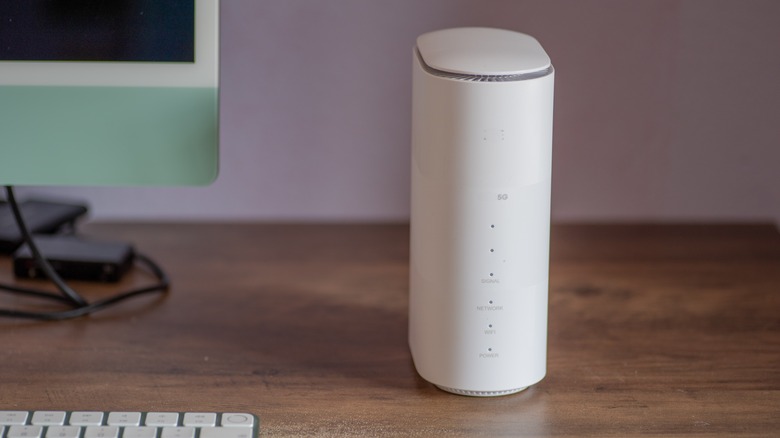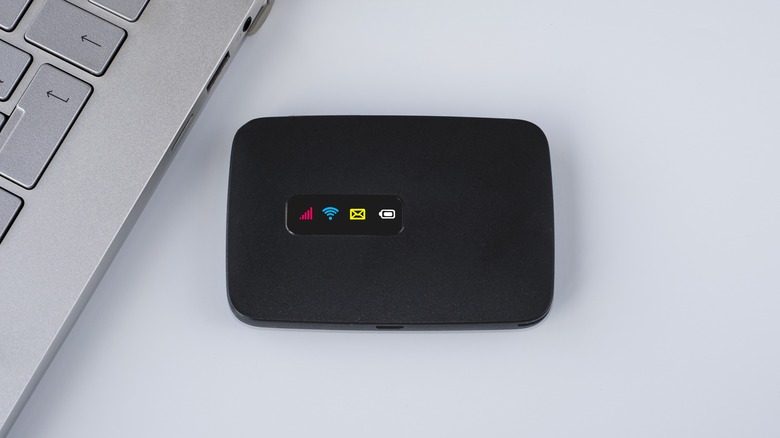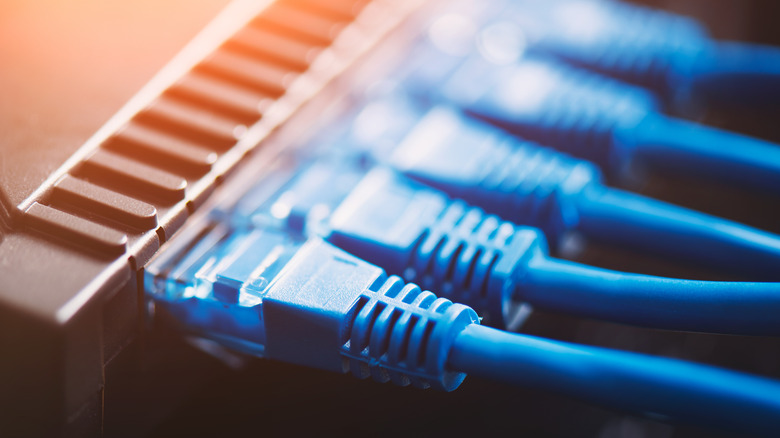Can 5G Really Be Used As A Home Internet Service?
Though it took longer than anticipated, fifth-generation wireless technology — more commonly called 5G — is now available throughout the U.S., as are devices designed to take advantage of the faster mobile broadband option. With the rise of 5G networks came a new type of service from a number of providers, including Verizon and T-Mobile: 5G home internet.
As the name suggests, these companies offer plans that make it possible for someone to use 5G as their primary internet service, doing so in place of cable, fiber, DSL, and even satellite offerings like Starlink. There is some appeal to the idea, as you may get a discount if you also get your cellular service through the same company, and it's easier to set up than cable and DSL. Whereas the latter two options require installation, a 5G internet service typically involves plugging in and turning on a compatible router.
Home 5G service plans also typically lack the contract that you may be locked into when you sign up for a traditional internet plan, and they have the advantage of being portable. If your router has a built-in battery, you can take it with you and use it like a hotspot while away from home. That's great and all, but whether it's worth it depends on the answer to one important question: can 5G realistically be used as a home internet service?
Not all 5G networks are the same
Before considering 5G as a home internet service, it's important to understand the differences between the two types of networks currently advertised: one is called mmWave 5G, and the other is called sub-6. While 5G smartphones are increasingly built to support both versions, the experiences on each type of network are very different.
Sub-6 5G is what most people are using when their phone shows a 5G symbol, and it is by far the most common in the United States. This is because sub-6 5G can span longer distances. The downside, however, is that sub-6 5G is considerably slower than what many expect when they think of 5G — it wasn't uncommon to experience 5G speeds slower than 4G LTE speeds on the same network when wireless carriers first started rolling out their next-gen networks (via PC Mag).
In comparison, mmWave 5G is much faster, but not easy to find. This is due to the short distances the signal can travel (via Verizon). For this reason, mmWave 5G is still largely limited to parts of big cities. Most people do not have access to the faster 5G network, meaning they may get speeds similar to or barely better than what they'd get from 4G LTE, at least in the United States. In 2020, Open Signal published an analysis of mobile broadband speed averages by country and found that the U.S. had some of the slowest speeds due to the lack of mmWave coverage.
It depends on how you plan to use the internet
When deciding what internet service is ideal for you, you need to consider how you'll use it. If your habits consist of social media, browsing the web, and YouTube videos, your experience with home 5G service will be different than that of someone playing competitive games. There are multiple aspects of internet usage that you need to keep in mind, including latency, data consumption, upload speeds, and uptime.
The good news is that the big wireless carriers currently offering 5G home internet in the U.S. don't have data caps (via T-Mobile, Verizon), including so-called soft data caps that throttle speeds once a certain threshold is reached. The bad news is that you may also experience unfavorable latency on 5G networks, as reported by some users (via Ericsson). This won't matter too much if you're watching TikTok videos but could prove very frustrating when trying to play "Overwatch."
You'll also want to consider the reliability of home 5G compared to something like cable. Think of the last time you were using your smartphone and the data connection slowed down and the number of bars dropped for no apparent reason. It's difficult to predict how well a 5G connection will perform in your home, and you may ultimately find it less consistent and reliable than wired internet. That could be a problem if you're relying on the service for work or school.
Reviews from users are very mixed
At the time of writing, many people have tried 5G home internet and their reviews of the experiences are mixed. While this is a great option to have, particularly for those who live in a building that isn't wired for cable or who aren't able to get decent DSL service, it appears that you may have to temper your expectations, at least until the technology matures. For example, Mitchell Clark reports at The Verge that his experience with T-Mobile's 5G home internet was marred by poor cellular connections, dropped signals, and trouble loading content and even entire web pages.
Some subscribers have reported similar frustrations on social media, such as one Redditor who called Verizon's 5G home internet service "trash." Another Reddit user said that after a few months with T-Mobile's 5G home internet service, they signed back up for Comcast due to slowdowns and other issues. For every negative review, however, there are just as many people who report positive experiences with 5G-based home internet services. The benefits, in those cases, seem to primarily revolve around faster speeds and the lack of data caps when compared to their local cable and DSL ISPs. The complaints, meanwhile, often cite issues with the internet failing to meet the user's needs at critical times, such as during a video call for work.
5G home internet can replace cable and DSL for some
At this time, the reality is that 5G home internet can replace cable and DSL connections for some people, but not everyone. If you live near a mmWave 5G tower or node and the service provider shows your address as receiving full coverage, your experiences with the technology will likely be favorable, and you may enjoy blazing fast speeds combined with lower latency and a truly unlimited data policy. If, however, you live somewhere that doesn't have great coverage, 5G home internet may prove frustrating for you with frequent slowdowns, connection drops, or latency issues.
This is likely to change over time as wireless carriers expand their networks and higher-speed technology becomes more commonly available for those living outside densely-populated metro regions. If you don't have access to cable or DSL, a 5G home internet service will likely prove much better than the 4G LTE you may be depending on now. If you have access to an affordable traditional internet service, you may want to think twice before abandoning it for a 5G alternative.




